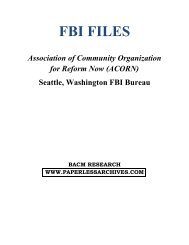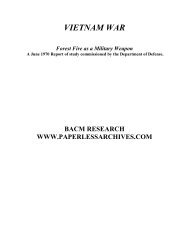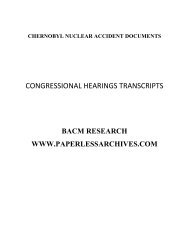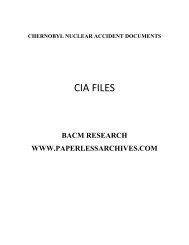national security agency journal articles world war ii german ...
national security agency journal articles world war ii german ...
national security agency journal articles world war ii german ...
You also want an ePaper? Increase the reach of your titles
YUMPU automatically turns print PDFs into web optimized ePapers that Google loves.
i<br />
I<br />
I,<br />
UNCLASSIFIED<br />
A World War II German Army Field Cipher and<br />
How We Broke It<br />
CHARLES DAVID<br />
In 1942 the U.S. Army Signal Corps was looking for college graduates to train in radar<br />
work, which was then new and promising. I enlisted, and after, six months of pre-radar<br />
courses in calculus, physics, chemistry, and radio theory at Rutgers University, I found<br />
myselfin Camp Crowder, Missouri, the Signal Corps basic training center.<br />
Once I was there, a classification sergeant informed me that Camp Murphy, the radar<br />
facility in Florida, was overcrowded and that I'd be assigned to some other training.<br />
Checking my academic record and Army Classification Test score, he suddenly asked me if<br />
I had ever heard of "cryptography."<br />
As he thumbed through his manual, my memory reverted to a cryptanalysis course<br />
that my fiancee had taken at Brooklyn College, given by Professor Jack Wolfe of the math<br />
department. She and I would sit in a sunny meadow in Prospect Park, and I helped with<br />
the frequency counts. My reverie was broken by the information that I was to be sent to<br />
Vint Hill Farms Station, near Warrenton, Virginia - close enough to my New York home<br />
and my wife-to-be to please me no end.<br />
Vint Hill was an unusual army camp - in a bucolic setting, with evergreen trees<br />
surrounding the barracks and woods all around. It was a hush-hush place, and we were<br />
constantly <strong>war</strong>ned to keep it so. One of its two parts was devoted to cryptanalysis studies,<br />
and the other was a working radio facility.<br />
The students were men of strong academic backgrounds and achievements. Of course,<br />
there was a large supporting cast of administrative cadre who tormented us with the usual<br />
army routine - drills, hikes, KP, inspections, and the like. However, there was<br />
communion among the "crypt" people as a result of the learning atmosphere and the<br />
intellectual interest engendered by these new and uncommon studies.<br />
Our classes were taught by sergeants. Once in a while an officer would appear from<br />
Arlington Hall, but Vint Hill was an enlisted men's camp and school. We religiously<br />
followed the texts of William Friedman and considered him our mentor. Men left after<br />
unpredictable time periods to join active units in both main theaters of the <strong>war</strong>. Most<br />
seemed to end up in our own signal centers and were involved with <strong>security</strong> matters.<br />
After seven months I was called in for an interview, and I was asked if I knew any<br />
German. I had studied the language for two years in high school and was able to read and<br />
translate a newspaper handed to me by an officer. He said that would do just fine, and I<br />
was assigned to a special class being formed.<br />
31 UNCLASSIFIED
















